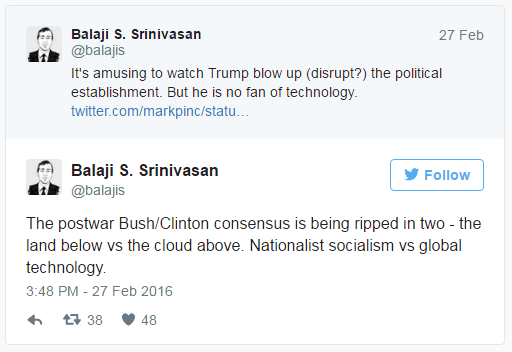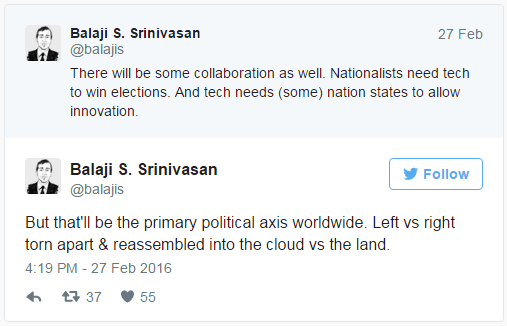Westphalexit

As technology advances, a world partitioned into nation-states makes less and less sense. That may sound crazy, if you take it as granted that our world must be divided into nations. But the whole concept of a “country” is a 400-year-old weird hack, riddled with crippling bugs, plagued by contradictions that sharpen each year. It is unlikely to survive this century.
So what comes next?
In 1648, European nobility and aristocrats got together in Westphalia, northwestern Germany, and signed treaties which ended both the Thirty Years’ War and the Eighty Years’ War. They also, in passing, laid the basis for the world as we know it today: one in which almost every scrap of land has been allocated to a “nation-state,” groups of humans defined by geography of all things, membership in which is the fundamental defining factor in human identities around the globe.
If you don’t think that’s true, try being Haitian or Zimbabwean, and see how different that is from your (presumably) rich Western citizenship. Oh, you have a green card? A work permit? An entry visa? Those are just other, lesser but still privileged, forms of nation-state membership. That, more than anything else except perhaps your health, is what most describes, and circumscribes, your life.
Does this not all seem a little odd and antediluvian to you, in today’s modern, ultra-networked, densely intertwined, post-geographic world? If you were going to redesign the social architecture of our world from scratch, would you begin with the nation-state as your basic building block? Really? Think about it. Really? I didn’t think so.
It may be hard to imagine a post-Westphalian world, given how much of our assumptions are built on the deep foundation of that structure; but to paraphrase the great Ursula K. Le Guin, “We live in nation-states. Their power seems inescapable–but so did the divine right of kings.”
Le Guin was actually talking about capitalism: let’s detour to discuss that for a moment. People tend to assume that those who believe in the end of the nation-state must be hardcore anti-government libertarians. This in turn is just evidence of how deeply Westphalia has infected the zeitgeist; people assume that the only alternative is, basically, no government at all. What a sad paucity of imagination.
In fact the Westphalian consensus has been withering away for many years. The nations of Europe joined together long ago into a European Union; Brexit is essentially a reactionary backlash against the decline of Westphalia. Its victory was mildly disheartening, in that it exemplified the petty, jealous form of xenophobia incentivized by nation-states.
But it was also a mere blip in the face of the overwhelming larger trend. Africa is moving ever closer to free movement among its 54 nations. It is following the lead of South America, which in 2009 adopted Mercosur’s Residence Agreement.
This increasing transnationalism seems like an inevitable side effect of the switched networks of IP packets and shipping containers drawing the four corners of our world ever closer together. But the EU, the African Union, Mercosur, etc., are still just umbrella organizations of nation-states, still limited by mere geography. That’s so twentieth century. Let us dream a little bigger.
Balaji Srinivasan–CEO of Counsyl and 21, partner at Andreessen Horowitz–is doing just that, per this fascinating tweetstorm from February, sampled below and fully available here:


Consider that finest of human inventions: the city. Both within and across nations, cities, and city people, often have far more in common with each other than with the rest of their nation. London, Paris, Tokyo, Toronto, Shanghai, New York, Mumbai, Buenos Aires, Dubai, Cape Town, Sydney — it is easy to feel more at home in all of these places than to go from any of them to a small rural settlement. This is true of both “elites” (a word now invariably used as a pejorative, outside of military contexts) and the legions of impoverished young students and travel-hungry twentysomethings.
Does it really seem likely, given all the above, that land borders and map colors will set the course of all human behavior forever? It seems to me that technology, by shrinking our world and forming ever denser connections all across it, is inciting the growth, in both number and size, of loose-knit transnational organizations which–over decades–will rise in importance until they begin to usurp our notions of national identities.
Thus far almost the only such organizations of real scale and importance are, of course, corporations. I’m faintly surprised that Google and IBM don’t already issue passports that holders can use to travel to, and work in, Westphalian nation-states.
But of course the Westphalians are jealous of sharing their power, and people are, rightly, deeply mistrustful of transnational corporations. Even–or maybe especially–tech companies. (As a deeply admirable and highly successful tech executive mused to me over dinner the other day: “I really think, at some point, the pitchforks will be coming for us in tech.”)
Some other form of transnational organization will have to be first. Only Nixon could go to China. I predict that international groups which initially seem trivial, or even laughable, will slowly grow in stature and importance until they become, in many ways, distributed nations of their own…without the limitations of that ugly hacks called a “state.” I don’t know which will be first, but I suspect it may already exist, in some nascent form. I also suspect that we will see a growing number of new city-states as this century progresses.
(Obviously I’m far from the first to predict this. Neal Stephenson did so more than twenty years ago with The Diamond Age, in which he described a world divided into dozens of different distributed nations, called “phyles,” each with its own scattered archipelago of territory around the world, along with cities and shared land where laws were dictated by the Common Economic Agreement among the phyles.)
Again, all the above may seem dubious, unlikely, or even completely insane, to anyone whose whole life has been steeped in a world defined by nation-states. But if you take a step back and look at that world, and how it’s changing, and the possibilities that new technology provides–I think you’ll find it’s hard not to see some livid writing on the Westphalian wall.
Copied from here: https://techcrunch.com/2016/07/09/westphalexit/
Please downvote.
Upvoted you